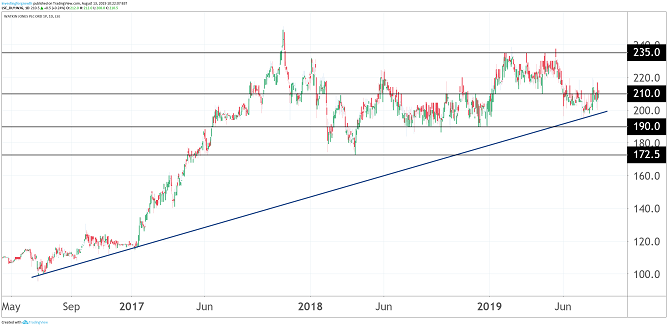Stockwatch: One Woodford stock I wouldn't worry over
The shares are victims of anti-Woodford sentiment, but this is a good company worth backing.
13th August 2019 10:48
by Edmond Jackson from interactive investor
The shares are victims of anti-Woodford sentiment, but this is a good company worth backing.

The saga of spotting risky valuations where Woodford Asset Management holds stock continues after hedge fund Muddy Waters has conceded it was a factor in its raid on AIM-listed Burford Capital (LSE:BUR).
It most likely also explains a 10% drop in the AIM-listed student accommodation developer Watkin Jones (LSE:WJG) in May as troubled fund manager Neil Woodford progressively trimmed his position from 11.78% to below 5% by early June.
That move took the stock price down from a 220-230p trading range to twice bottom out at 200p in July.
A recovery to 210p mitigates the drop to about 6% and I think Watkin demonstrates that Woodford is selling relatively good quality – hence liquid – holdings to address his principal fund's liquidity crisis.
There has been no adverse news from the company, and buyers on the other side of such trades are implicitly taking the bullish line that I described last April at 220p.
No fresh holdings above 3% have been declared, or 3%-plus holders adding to their stakes, but most likely the stock would have been placed, otherwise the price would have slid much further.

Source: TradingView Past performance is not a guide to future performance
Silver lining to the effects of a Brexit-led recession
With a hard Brexit rearing its head, there's fear a recession will impact construction of various kinds as budgets tighten – unless lucky enough to be part of the Johnson government's public spending spree. It would be prudent to be aware how many universities have been expanding their infrastructure and facilities, which could come under review to some extent.
As a theme, "student accommodation" has become quite a bandwagon, although much has needed doing to address the demand gap over the entirety of degree courses.
Like its £3 billion mid cap peer Unite Group (LSE:UTG), the £537 million Watkin Jones is a developer/operator of student accommodation rather than an owner, so should not be impacted by a worse-case scenario of asset devaluation if Brexit proves a short to medium-term disaster.
If sterling remains weak versus international currencies, this would raise the attractions of UK higher education among foreign students – where English is already the language of international commerce.
So, in terms of macro risk/reward, yes it would be prudent to pay attention to recession signs emerging but the sense of a crisis around demand for UK university places – as students boycott in fear of assuming debt – is misplaced. It might well create near-term news articles on whether a university education is all-round worthwhile, and statistics showing some drop in UK demand.
But unless the courses were of questionable value and due a shake-out anyway, places should promptly be snapped up abroad.
| Watkin Jones - financial summary | Consensus estimates | ||||||
|---|---|---|---|---|---|---|---|
| Year ended 30 Sep | 2014 | 2015 | 2016 | 2017 | 2018 | 2019 | 2020 |
| Turnover (£ million) | 227 | 244 | 267 | 327 | 363 | 391 | 442 |
| IFRS3 pre-tax profit (£m) | 14.1 | 32.9 | 13.3 | 43.3 | 54.3 | ||
| Normalised pre-tax profit (£m) | 14.2 | 36.1 | 19.8 | 43.3 | 50.1 | ||
| Operating margin (%) | 6.7 | 14.3 | 6.3 | 16.3 | 16.5 | ||
| IFRS3 earnings/share (p) | 4.4 | 10.4 | 3.8 | 14.0 | 17.3 | ||
| Normalised earnings/share (p) | 4.4 | 11.7 | 8.6 | 14.0 | 16.0 | 16.3 | 18.0 |
| Earnings per share growth (%) | 123 | 164 | -26.3 | 62.8 | 14.3 | 1.9 | 10.4 |
| Price/earnings multiple (x) | 13.2 | 12.9 | 11.7 | ||||
| Cash flow/share (p) | 18.6 | 11.1 | 11.2 | 18.1 | 21.3 | ||
| Capex/share (p) | 1.9 | 1.9 | 1.8 | ||||
| Dividend per share (p) | 4.0 | 6.6 | 7.6 | 8.1 | 9.0 | ||
| Yield (%) | 3.6 | 3.6 | 4.3 | ||||
| Covered by earnings (x) | 2.2 | 2.1 | 2.1 | 2.0 | 2.0 | ||
| Net tangible assets per share (p) | 34.2 | 43.6 | 54.3 | ||||
| Source: Company REFS and published accounts | |||||||
Mixed signals on value within a "quality business" profile
Admittedly also, care is needed with Watkin's valuation. The current stock price of 210p is 16% off its November 2017 high of 249p, after which it traded rather volatile-sideways in a consolidation phase – albeit far less volatile than Burford Capital before its chart has broken down on a bear raid.
The parallel is a consolidation, reflecting a market in two minds after a strong rally – Watkin had risen from 217p in January 2017 – which is unsurprising given Watkin's more recent benchmarks. It comes across as a growth company with a modest forward price/earnings (PE) ratio of around 12 times, although growth in earnings per share is quite stalled in context (see table), making for a less-favourable PEG ratio around 1.3 times.
However, the cash flow profile is strong versus earnings and, with low capital spending needs, Watkin generates high free cash flow, aided by respectable operating margins in the mid-teens percent.
Returns on equity and capital employed are high to mid-20% respectively, flagging a quality business.
If management's narrative worsens, however, a circa 4% yield isn't exactly a prop and, whether you compute net asset value (NAV) with or without intangibles, it is less than a third of the stock price.
- This share offers defensive upside
- You can also invest in UK equities via ii's Super 60 recommended funds. Click here to find out more
Interims to end-March 2019 continue the mixed story: a profit/revenue split with most profit measures up 8-10% - adjusted pre-tax profit rose 10% to £26.0 million - albeit revenue only edging ahead 0.5% to £159.1 million.
The narrative skipped much explanation, but from the income statement the profit boost derived from cost of sales as a percentage of revenue falling from 78.2% to 76.3%, beating a rise in admin expenses as a percentage of turnover from 6.8% to 7.3% given admin is the smaller variable cost.
Results were also sullied a tad by a £2.6 million cost for compensating the new CEO for leaving his share/bonus arrangements at Unite Group – treated as exceptional but obviously still a cost.
The interim dividend rose 11.3% to 2.75p albeit with plenty of cover, as adjusted EPS rose 7.7% to 8.1p.
As a brief departure from Watkin's strong cashflow profile, working capital demands led to a £48.8 million net operating cash outflow during the period, which meant end-March cash was £18.3 million versus £38.4 million the year before.
Note that this was accentuated by a £14 million delayed cash payment which was received in April.
Ongoing confidence in the market dynamics
Management declares:
"the underlying market dynamics for both student and build-to-rent accommodation are strongly supportive of the group's forward sale model...excellent visibility on future earnings and cash flow."
Note 4 to the accounts shows segmental gross profit (I calculate) student accommodation development at 81% of gross profit with such facilities management at 6% of gross profit, while "build to rent" was 5% and residential was 8%. So, despite double-digit exposure to the wider property market we're essentially looking at a play on continued development of student facilities.
An end-July development update upheld a busy narrative if tricky to quantify the like-for-like comparable trend. Contracts have been exchanged for £19.6 million, payable by a European investor for the forward sale of a 197-bed development in Canterbury – scheduled for completion ahead of the 2020/21 academic year.
There's planning permission for a 462-bed development in Leicester scheduled for the 2021/22 year.
There's also funding agreed for a 245-bed development in Swansea, originally declared in April, and a site secured in Exeter city centre for a 170-bed development for completion ahead of the 2022/23 year.
In build-to-rent, a site has been secured close to Hove railway station with planning permission for 186 residential units and 2,000 square metres of commercial space – as part of Watkin's "growing build-to-rent development pipeline" – and targeted for delivery in its 2022 financial year.
There's also planning consent on a 184-unit, residential development in Leicester adjacent to the student accommodation, for delivery in the 2021 financial year.
Management contends that its business model/strategy is "extremely resilient", its chosen sectors being "highly attractive" to investors, which is fair enough on a comparable basis within the property sector.
Though wary of hyperbole, I concur there's further mileage in both student and rental accommodation development, Watkin's principal business being underwritten by foreign students' respect for UK higher education rather than specifics of stock yield/NAV. So I maintain: Buy.
Edmond Jackson is a freelance contributor and not a direct employee of interactive investor.
These articles are provided for information purposes only. Occasionally, an opinion about whether to buy or sell a specific investment may be provided by third parties. The content is not intended to be a personal recommendation to buy or sell any financial instrument or product, or to adopt any investment strategy as it is not provided based on an assessment of your investing knowledge and experience, your financial situation or your investment objectives. The value of your investments, and the income derived from them, may go down as well as up. You may not get back all the money that you invest. The investments referred to in this article may not be suitable for all investors, and if in doubt, an investor should seek advice from a qualified investment adviser.
Full performance can be found on the company or index summary page on the interactive investor website. Simply click on the company's or index name highlighted in the article.
Disclosure
We use a combination of fundamental and technical analysis in forming our view as to the valuation and prospects of an investment. Where relevant we have set out those particular matters we think are important in the above article, but further detail can be found here.
Please note that our article on this investment should not be considered to be a regular publication.
Details of all recommendations issued by ii during the previous 12-month period can be found here.
ii adheres to a strict code of conduct. Contributors may hold shares or have other interests in companies included in these portfolios, which could create a conflict of interests. Contributors intending to write about any financial instruments in which they have an interest are required to disclose such interest to ii and in the article itself. ii will at all times consider whether such interest impairs the objectivity of the recommendation.
In addition, individuals involved in the production of investment articles are subject to a personal account dealing restriction, which prevents them from placing a transaction in the specified instrument(s) for a period before and for five working days after such publication. This is to avoid personal interests conflicting with the interests of the recipients of those investment articles.